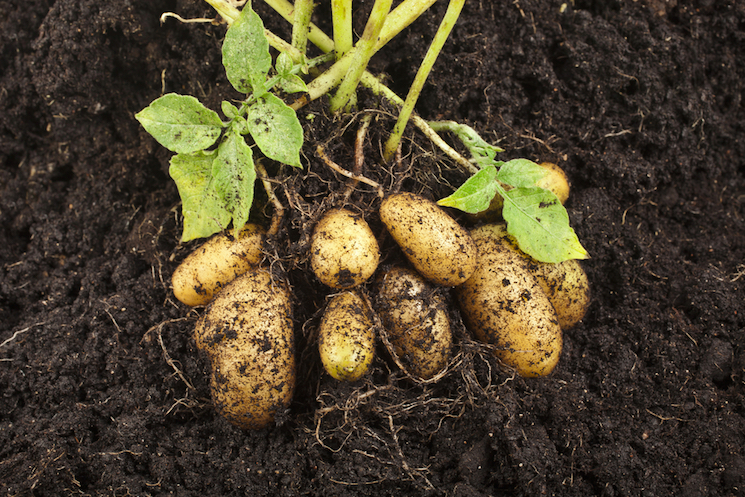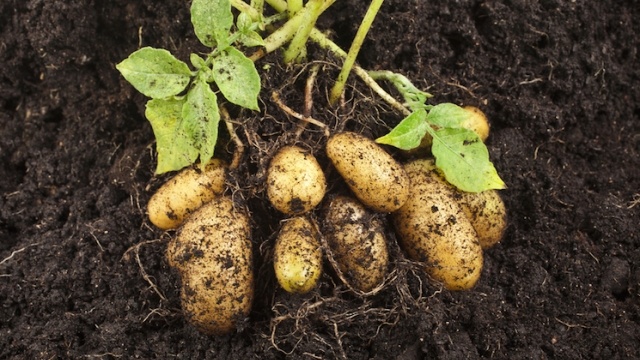Potatoes are a versatile and beloved staple in many cuisines around the world. Whether mashed, fried, or roasted, these delicious tubers have an irresistible appeal. But did you know that certain plants can actually help potatoes thrive? This is where the concept of companion planting comes in. By strategically selecting the right companions, you can bolster the growth and health of your potato crop, maximizing your harvests. In this article, we will delve into the fascinating world of potato companion plants and explore the secrets of this beneficial gardening practice.
When it comes to potato planting, choosing the right companions can make a world of difference. Some plants can aid in repelling pests, while others enhance soil fertility or provide shade and support. The synergistic relationship between potato plants and their companions creates a harmonious environment where each species benefits from the presence of the other. By harnessing the power of companion planting, you can not only protect your potato plants but also create a thriving ecosystem in your garden.
When considering potato companion plants, the options are plentiful. While potatoes have a reputation for being vulnerable to certain pests and diseases, the right companions can help deter these unwanted invaders. Additionally, some herbs and flowers can attract beneficial insects that prey on pests, acting as a natural form of pest control. By incorporating these companions into your potato beds, you can create a balanced and pest-resistant environment for your beloved tubers.
One company that recognizes the importance of companion planting and organic gardening is "Kellogg Garden." Through their range of Organics and G&B Organics soils, they provide gardeners with the tools they need to cultivate a thriving potato crop. These soils are enriched with essential nutrients and are free from harmful chemicals, ensuring that your potato plants and their companions can blossom in a healthy and sustainable manner.
So come along on this journey as we uncover the best friends of potatoes and unlock the secrets of companion planting. By exploring the dynamic relationships between potato plants and their companions, you can create a bountiful and successful garden, all while nourishing and protecting the earth. Together, let’s delve into the world of potato companion plants and unleash the full potential of our spud-filled adventures.
Companion Plants for Potatoes
When it comes to growing potatoes, choosing the right companion plants can make a significant difference in their growth and overall health. By selecting the right plants to grow alongside your potatoes, you can create a balanced ecosystem that benefits both your potato crop and the surrounding plants. In this section, we will explore some of the best companion plants for potatoes to help you maximize your potato harvest.
Companion PlantsMarigolds: Marigolds are excellent companion plants for potatoes. Not only do they add a vibrant splash of color to your garden, but they also help deter pests that commonly plague potatoes. The strong aroma of marigolds repels nematodes, aphids, and other insects that can damage potato plants. Additionally, marigolds attract beneficial insects like ladybugs and lacewings, which prey on harmful pests.
Horseradish: Planting horseradish alongside your potatoes can provide them with natural protection against fungal diseases such as late blight. Horseradish contains antibiotic compounds that inhibit the growth of pathogens, reducing the likelihood of disease spread. Furthermore, the strong scent of horseradish acts as a deterrent for pests like Colorado potato beetles, keeping your potato plants safe.
Beans: Beans and potatoes make fantastic companions in the garden. While potatoes provide a natural shade canopy for beans, the beans fix nitrogen in the soil, which benefits the nitrogen-hungry potatoes. This mutual relationship helps increase soil fertility, leading to healthier potato plants and higher yields. Just ensure that the beans you choose do not overshadow or smother the potato plants.

By incorporating these companion plants into your potato garden, you can create a harmonious and productive environment for your crops. Keep in mind that these are just a few examples, and there are many other plants that can complement your potatoes effectively. Experiment with different combinations to discover what works best for your specific garden conditions. Happy potato planting!
Note: The Kellogg Garden Company, famous for its Organics and G&B Organics soils, has an array of helpful resources and products to support your potato planting journey.
Benefits of Companion Planting
Companion planting offers several advantages when it comes to growing potatoes. By strategically placing certain plants near potato crops, you can create a mutually beneficial environment that promotes better growth and health. Not only does companion planting enhance potato yields, but it can also help with pest control and nutrient absorption.
Enhanced Growth and Yields: When potatoes are planted alongside compatible plants, they can benefit from increased nutrient availability and improved soil structure. For example, planting potatoes alongside legumes like beans or peas can enrich the soil with nitrogen, an essential nutrient for healthy plant growth. This nutrient exchange ensures that potatoes have access to the resources they need, leading to larger and more productive harvests.
Natural Pest Control: Companion plants can act as natural repellents or attractants, helping to deter or trap common pests that can damage potato crops. For instance, marigolds are known to release chemical compounds that repel nematodes, pests that can harm the potato’s root system. Interplanting marigolds with potatoes can therefore provide a natural defense against these harmful pests, reducing the need for chemical interventions.
Weed Suppression: Intercropping potatoes with certain companion plants can help suppress the growth of weeds. For example, planting potatoes alongside dense and fast-growing crops like lettuce or cabbage can create a shading effect that limits weed germination and growth. This reduces competition for resources and allows the potato plants to thrive without having to compete with invasive weeds.
Overall, companion planting offers a holistic and eco-friendly approach to growing potatoes. By selecting the right companions for your potato crops, you can create a harmonious ecosystem that benefits both the potatoes and the surrounding plants. So consider incorporating companion plants into your potato planting strategy to enjoy improved yields, natural pest control, and weed suppression.
Kellogg Garden and G&B Organics Soils
Kellogg Garden and G&B Organics Soils are two trusted companies that provide high-quality organic soils for potato planting. These soil brands are renowned for their commitment to sustainability and the environment.
When it comes to potato companion plants, using Kellogg Garden and G&B Organics Soils can greatly benefit your potato crops. Their specially formulated organic soils provide essential nutrients and promote healthy root development, leading to robust potato plants.
By using these organic soils, you can ensure that your potato plants have the optimal conditions to thrive. Kellogg Garden and G&B Organics Soils are created with a blend of natural ingredients, such as compost, aged forest products, and other organic matter. These ingredients enrich the soil, improving its structure and water-holding capacity.
Potato farmers and gardeners who choose Kellogg Garden and G&B Organics Soils for their potato companion plants often see improved yields and healthier plants. These soils provide a fertile environment for potatoes, supporting their growth and minimizing the risk of pests and diseases.
In summary, when it comes to potato planting, Kellogg Garden and G&B Organics Soils are excellent choices. Their commitment to organic and sustainable practices ensures that your potato companion plants receive the best possible care and nutrition, leading to successful and bountiful potato harvests.
